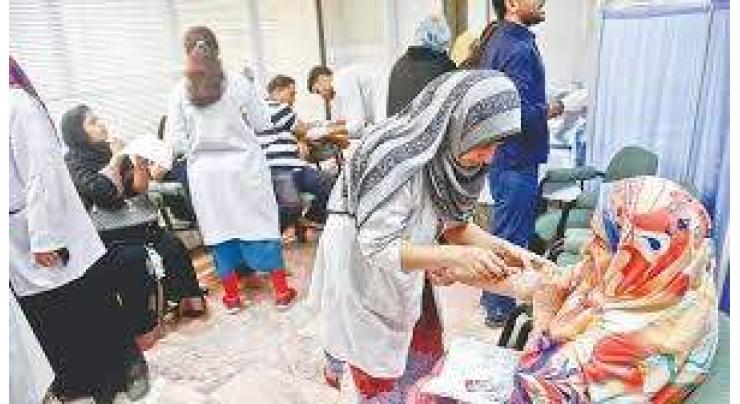
- Home
- Pakistan
- News
- National Institute of Health (NIH) issues alert on epidemic-prone infectious diseases
National Institute Of Health (NIH) Issues Alert On Epidemic-prone Infectious Diseases
Umer Jamshaid Published April 19, 2019 | 03:59 PM

National Institute of Health (NIH) has issued Seasonal Awareness and Alert Letter (SAAL) for epidemic-prone infectious diseases in Pakistan
ISLAMABAD, (UrduPoint / Pakistan Point News - 19th Apr, 2019 ) :National Institute of Health (NIH) has issued Seasonal Awareness and Alert Letter (SAAL) for epidemic-prone infectious diseases in Pakistan.
According to an official of NIH, the main purpose of this alert was to inform all concerned health authorities and professionals at all levels and to facilitate them for timely and efficient response to the outbreaks or epidemics.
He said this alert letter was developed for spring season from March to June, 2019. In this letter, NIH exhibited patterns of high priority communicable diseases including Chikungunya, Cholera, CCHF, Dengue, Leishmaniasis, Measles, Polio and Pertussis.
These diseases are predicted to be on high alert during the season while alert also contains detailed introduction of diseases, case definitions, infectious agents, modes of transmission, case management and prevention.� Through this letter, NIH also informed about national and international public health events like Typhoid Fever (Extensively Drug Resistance strain) and Naegleria fowleri as national while Ebola Virus Disease, and middle East Respiratory Syndrome Coronavirus (MERS CoV) considered as International events during spring season.
He said the NIH also advised the Federal, provincial and district health departments as well as other stakeholders to take keep a continuous watch on the anticipated seasonal public health threats and taking of all preventive or curative measures in this context.
There is an additional information regarding 'Mosquito Alert Pakistan app' also included in this letter. NIH has recently launched its first-ever android based application which will help to collect information about mosquito species present in different areas.� �The institute also issued an advisory regarding pollen allergy and suggested various preventive steps during the pollen season including limiting outdoor activities during high pollen counts, keeping windows and doors closed, limiting close contact with pets�and using filter masks while going outside.
Recent Stories

Tennis: ATP Barcelona Open results - 1st update

Swiatek's perfect 10 in Stuttgart as Vondrousova stuns Sabalenka

Arandu's roads closed due to flooding

Oil tanker catches fire in Islamabad’s Blue Area

Pakistan committed to ensure safety of foreign nationals: FO

Tennis: WTA Stuttgart results - 1st update

Four passengers injured as train hit an empty vehicle

Over- speeding bus crushed to death two bike riders

Turkey's Freedom Flotilla ready to set sail for Gaza

French teen dies from heart failure after knife attack near school

Iranians appear unfazed by Isfahan blasts

UAF celebrates Int'l Chinese Language Day
More Stories From Pakistan
-
NHA restores most roads across the country after heavy rains
6 hours ago -
Three bike lifter gang held, five stolen motorbikes recovered
6 hours ago -

Arandu's roads closed due to flooding
8 hours ago -

Oil tanker catches fire in Islamabad’s Blue Area
8 hours ago -

Pakistan committed to ensure safety of foreign nationals: FO
8 hours ago -

Four passengers injured as train hit an empty vehicle
8 hours ago
-

Over- speeding bus crushed to death two bike riders
8 hours ago -

UAF celebrates Int'l Chinese Language Day
9 hours ago -

Flooding on Chitral-Peshawar Highway strands travelers
9 hours ago -

Bilawal Bhutto demands govt to hold tripartite dialogue to curb terrorism
9 hours ago -

Punjab ombudsman facilitates over 1.36 crore payment to victims
9 hours ago -

Leghari seeks KP Govt’s cooperation in anti-power theft campaign
9 hours ago









